The 24th Meeting of the Council of Heads of State of the Shanghai Cooperation Organization (SCO) was held on July 3rd and 4th at the Palace of Independence in Kazakhstan's capital. This summit marked the first time the SCO convened in the "SCO+" format, enabling participants and international organizations to engage in more extensive multilateral exchanges and cooperation and expanding the opportunities and mechanisms for collaboration between SCO member states and other countries and institutions. The summit in Astana resulted in the adoption of 25 documents, including the "Astana Declaration," the initiative "On World Solidarity for Justice, Peace, Harmony, and Development," the "SCO Development Strategy 2035," the "2025-2027 Action Plan for Cooperation in Combating Terrorism, Separatism, and Extremism," the "2024-2029 Anti-Drug Strategy," and the "SCO Economic Development Strategy 2030." This summit also marked Iran's first formal participation as a full member state and the ascension of Belarus to member status.
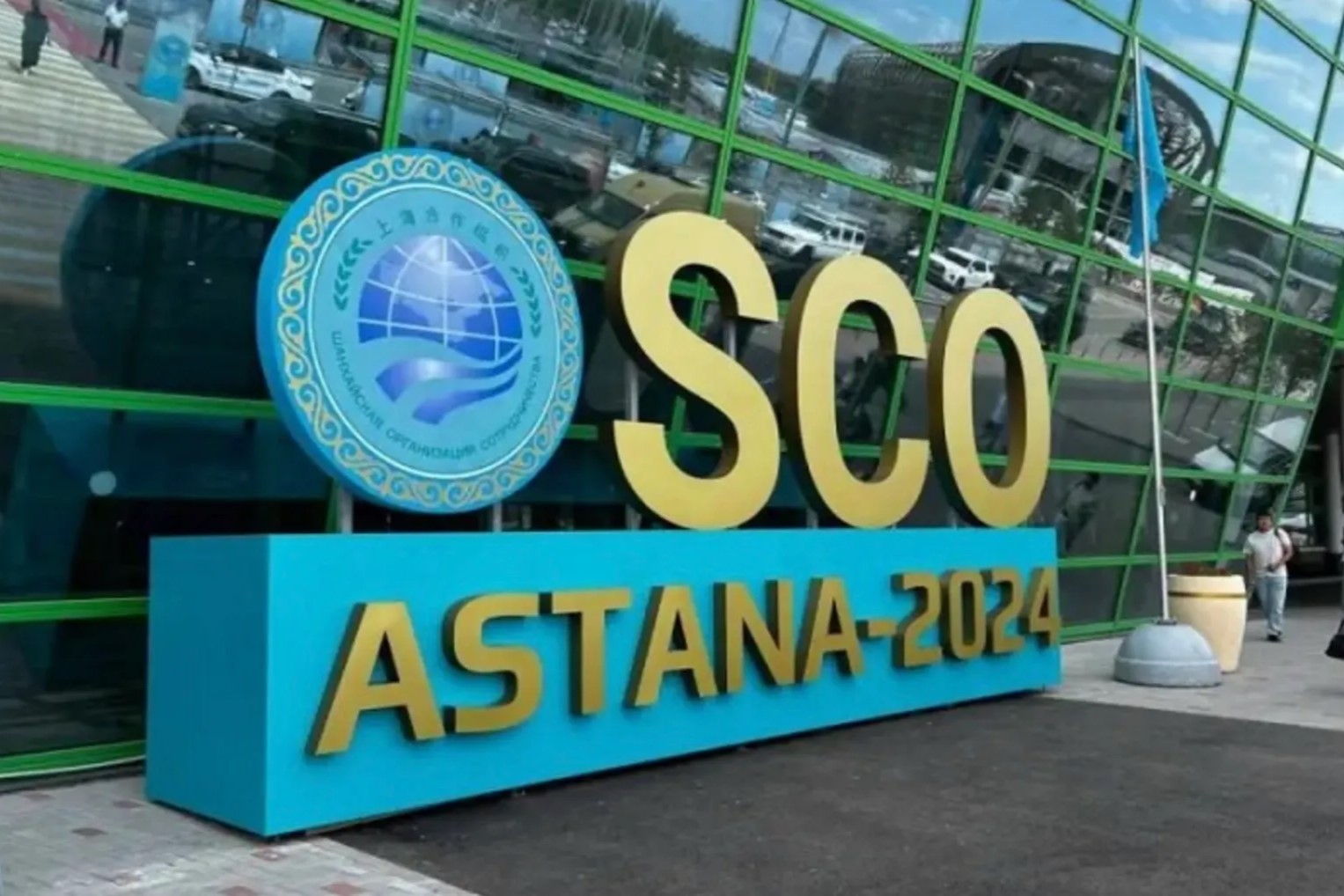
The Shanghai Cooperation Organization (SCO) held its 24th summit of heads of state on July 4 in Astana, Kazakhstan. Source: Asia Times
Organizational Affairs
The summit saw several organizational changes and personnel reshufflings within the SCO. Belarus officially became the tenth member state of the SCO, while Mongolia announced its intention to continue holding observer status (AKI Press). In an interview with Xinhua, Professor Andrei Rusakovich, an expert on the history of Belarusian foreign policy at the Eurasian Studies Department of the Belarusian State University, evaluated Belarus joining the SCO as a sign of the country’s recognition of “the tremendous development potential of the SCO as a regional cooperation organization.” He went on to add that ‘Belarus aims to use the SCO platform to expand multilateral cooperation and interaction, deeply participate in regional development across various fields, and strengthen comprehensive cooperation with Global South countries’ (Xinhua). Currently, the SCO represents a population of over three billion people and includes large rapidly growing economies with a GDP accounting for a quarter of the world’s total (Kremlin) which demonstrates the immense potential and global standing of the SCO.
The summit reviewed Kazakhstan’s achievements during its chairmanship while concluding its fourth rotating presidency of the SCO. China just took over the chairmanship for 2024-2025, and the next summit of the heads of states will be held in China (Tengri News). Additionally, Kazakhstani diplomat Nurlan Yermekbayev who previously served as Deputy Secretary-General under Zhang Ming was appointed as the SCO Secretary-General for 2025-2027 (Tengri News).
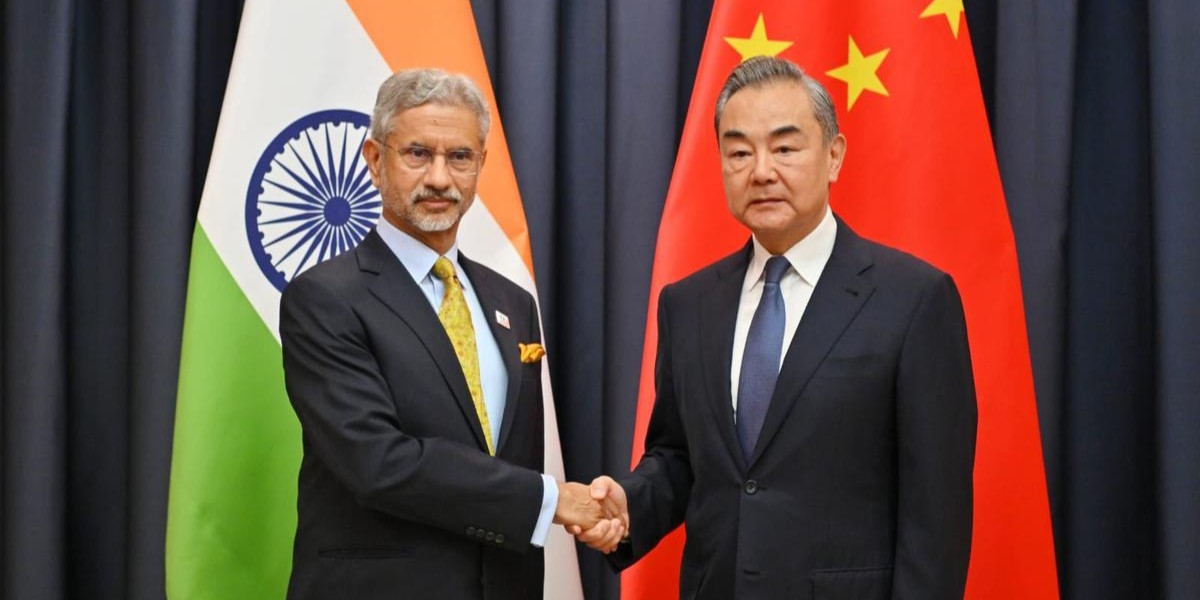
Indian External Affairs Minister S. Jaishankar meeting with Chinese counterpart Wang Yi at the SCO Summit in Astana. Source: India Today
Security Cooperation
Security remained a central topic of discussion at the summit. The "Astana Declaration" emphasized that the global political, economic, and international relations landscape is undergoing significant transformations, moving towards greater multipolarity. This shift can create more opportunities for developing countries to engage and cooperate on an equal footing and on a mutually beneficial basis. However, it was also noted that power politics are on the rise, with an increasing number of cases deemed to violate international law. These developments are escalating geopolitical confrontations and conflicts, posing greater risks to global and regional stability within the SCO area (Sectsco). In this context, the summit also addressed the ongoing efforts to mitigate the “three evils” of terrorism, separatism, and extremism with a focus on armed confrontations and sources of conflicts in regions, as well as energy security issues.
Russian President Vladimir Putin emphasized that maintaining the security of SCO member states remains a top priority, noting that the summit had decided to establish a comprehensive center to address security threats based on the SCO Regional Anti-Terrorist Structure (Kremlin). Additionally, the summit resolved to establish an SCO Anti-Drug Center in Dushanbe (Asia Plus Tajikistan). Tajikistan’s Foreign Minister stated that the activities of this center would be governed by an international agreement, which the SCO member states will formulate following the Astana summit (Asia Plus Tajikistan). Earlier, Tajikistan hosted interdepartmental consultations on April 24-25, 2023, in Dushanbe, focusing on establishing the SCO Anti-Drug Center as a permanent independent institution.
The summit also underscored Central Asia’s place at the heart of the SCO, and the crucial need for creating a secure environment in the Eurasian region based on this centrality (Tengri News). Following consultations among member states, India and China reached an agreement to begin negotiations to resolve their border disputes through increased diplomatic and military cooperation (India Today). During the talks, Indian and Chinese leaders focused on resolving the ongoing border disputes, particularly in the Ladakh region along the Line of Actual Control (LAC). Meanwhile, Russian President Vladimir Putin noted his appreciation for Turkey's contribution to the Russian-Ukrainian negotiations and stated that further talks with Ukraine would be held under the Istanbul agreement (Kremlin).
Regarding Afghanistan and Palestine, the SCO members emphasized the need for cooperation with the Taliban to create a stable and secure environment for the greater region (Tolo News). The participants expressed support for Kazakhstan’s initiative to establish a UN Regional Center for Sustainable Development Goals for Central Asia and Afghanistan in Almaty, as well as an international biosecurity institution accountable to the UN Security Council. Meanwhile, delegates criticized the actions leading to civilian casualties in the Gaza Strip. The member states voiced serious concern over the intensifying Israeli-Palestinian conflict, condemning the events that have caused significant civilian suffering and a worsening humanitarian crisis in Gaza. SCO leaders stressed the urgent necessity of establishing a lasting ceasefire and advocated for increased efforts to secure peace, stability, and security for the whole region. They also highlighted that achieving a comprehensive and just solution to the Palestinian issue is crucial for ensuring enduring peace and stability in the Middle East. (TASS, IRNA).
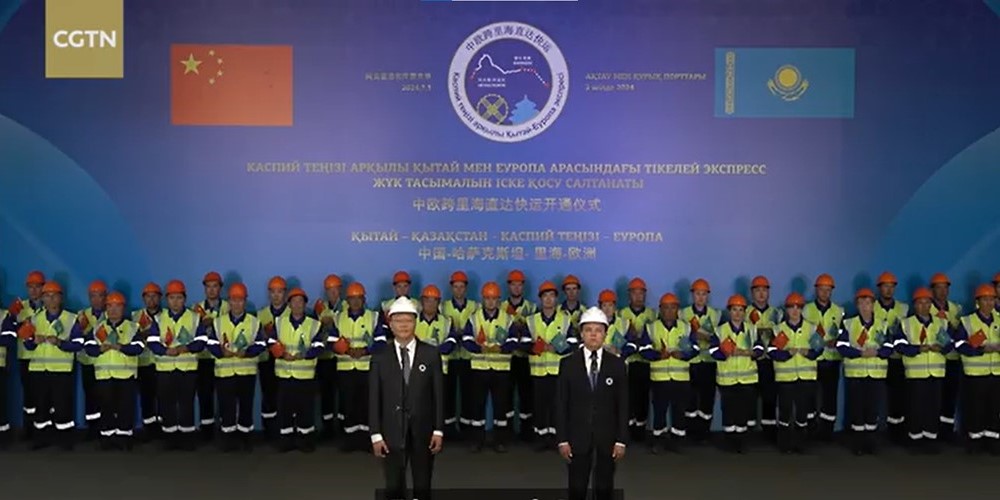
Presidents of Kazakhstan and China jointly launched the Trans-Caspian Express via video link. Source: CGTN
Transport, Logistics, Connectivity
Cooperation in logistics has been a major topic of discussion within SCO throughout recent years. Currently, numerous connectivity projects are underway within the geographical scope of the SCO. Turkmenistan's leader, Gurbanguly Berdimuhamedov, emphasized the importance of effectively utilizing the potential for cooperation in the transportation and energy sectors. He invited SCO member states to join the Agreement on the Creation of Favorable Conditions for International Road Transport, signed in Dushanbe in 2014. Speaking about the transport and transit corridor running through Central Asia from China to Europe and the Middle East, Berdimuhamedov urged other member states to pay attention to the China-Kyrgyzstan-Uzbekistan-Turkmenistan-Iran-Turkey route and the construction of the Kazakhstan-Turkmenistan-Iran railway (Turkmen Portal), as optimal utilization of this sector's existing potential will enhance interactions along the North-South and East-West lines, promoting economic integration in the region and across the Eurasian space.
In the meantime, Mongolia emphasized the need for effective cooperation in the transportation and energy sectors. The president of Mongolia Khurelsukh stressed that, based on its unique location that connects Asia to Europe, Mongolia is working towards the goal of becoming “Transit Mongolia”, the hub for trade, tourism, transport, logistics network, the flow of cargo transport, and services (Montsame). This includes the gas pipeline project that will transport natural gas from Russia to China through Mongolian territory, which is a part of the Mongolia-Russia-China economic corridor plan. Similarly, the President of Tajikistan, Rahmon, reiterated his call for SCO countries to join the Dushanbe agreement and highlighted ongoing major projects in roads, railways, energy, and tourism (Aisa Plus Tajikistan).
Additionally, the leaders of China and Kazakhstan jointly participated in the inauguration ceremony of the China-Europe Trans-Caspian Express at the Presidential Palace in Astana. This marks the official completion of a multidimensional connectivity network integrating highways, railways, airlines, and pipelines in order to better link Asia with Europe via the Caspian Sea, the world's largest inland body of water (China Daily).
Meanwhile, the Iranian Acting President Mokhber also underscored the significance of transit corridors in facilitating trade, economic development, and political stability among member countries and invited the member states to ‘trade with other countries through Iran's North-South Corridor and southern ports at a lower cost and a faster pace’ (IRNA).
Space Cooperation
During the summit, Russia and China proposed enhanced cooperation in space projects. "All parties are welcome to use the Beidou satellite navigation system and participate in the construction of international lunar research stations," said Chinese President Xi Jinping. Speaking to Xinhua, Russian space expert Andrei Yonin noted, "Russia and China have been actively promoting cooperation in the application of the GLONASS and Beidou systems and the construction of lunar stations in recent years. Strengthening space cooperation is in the interests of all mankind, and this invitation will attract more partners and promote the development of broader space cooperation." (Xinhua). Such initiatives have the potential to take cooperation on connectivity among SCO member states to a new level. At the same time, the Minister of Digital Development, Innovations and Aerospace Industry of Kazakhstan announced that Kazakhstan has received a 100-million-yuan grant from China to further develop its space industry (Kursiv).
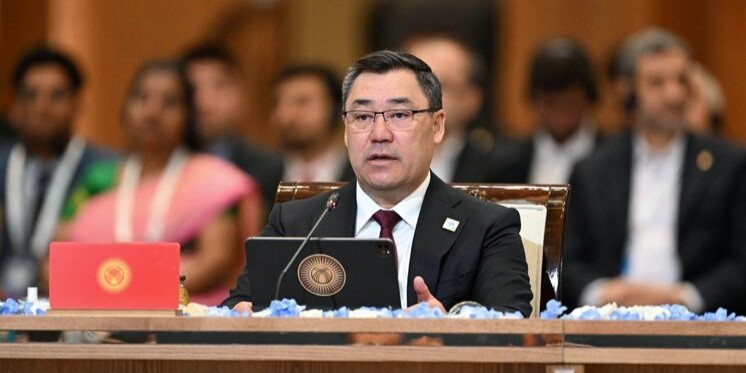
President Sadyr Japarov at the SCO summit, urging member states for creation of the SCO Development Bank and the SCO Development Fund. Source: 24.Kg
Banking, Financial Centers, Digital Connectivity
SCO member states highlighted the necessity of establishing an independent platform to discuss and approve investment projects. ‘The Member States stressed the need for providing financial support for project activities with a view to tap the Organization’s investment potential in full and therefore for continuing consultations on the establishment of the SCO Development Bank and the SCO Development Fund (Special Account)’, reads the Astana Declaration (Sectsco). Kyrgyzstan called for continued efforts to reduce trade barriers across the SCO to create an open economic environment and strengthen the multilateral trading system, and repeatedly emphasized the need to set up specialized financial institutions like the SCO Development Bank and the SCO Development Fund (24 KG). Kazakhstan proposed using the Astana International Financial Centre (AIFC) as the base for financing project activities, as China, Russia, India, Uzbekistan, and Kyrgyzstan are already actively working within the AIFC system (Kaz Inform). Iranian Acting President Mokhber also welcomed the establishment of the organization's banking union, suggesting that it could strengthen cooperation in the financial and economic sectors. He recommended preferential and free trade agreements among the Eurasian organization members, advocating for stronger transit and banking links to facilitate cooperation using national currencies and addressing regional security and energy strategy issues simultaneously (Tehran Times).
In the meantime, the SCO will continue to deepen digital cooperation among the member states. To this end, Kyrgyzstan plans to host the SCO Youth Digital Forum in Bishkek in 2025, which is believed to significantly contribute to regional cooperation in digital technology and youth policy among SCO countries (24 KG).
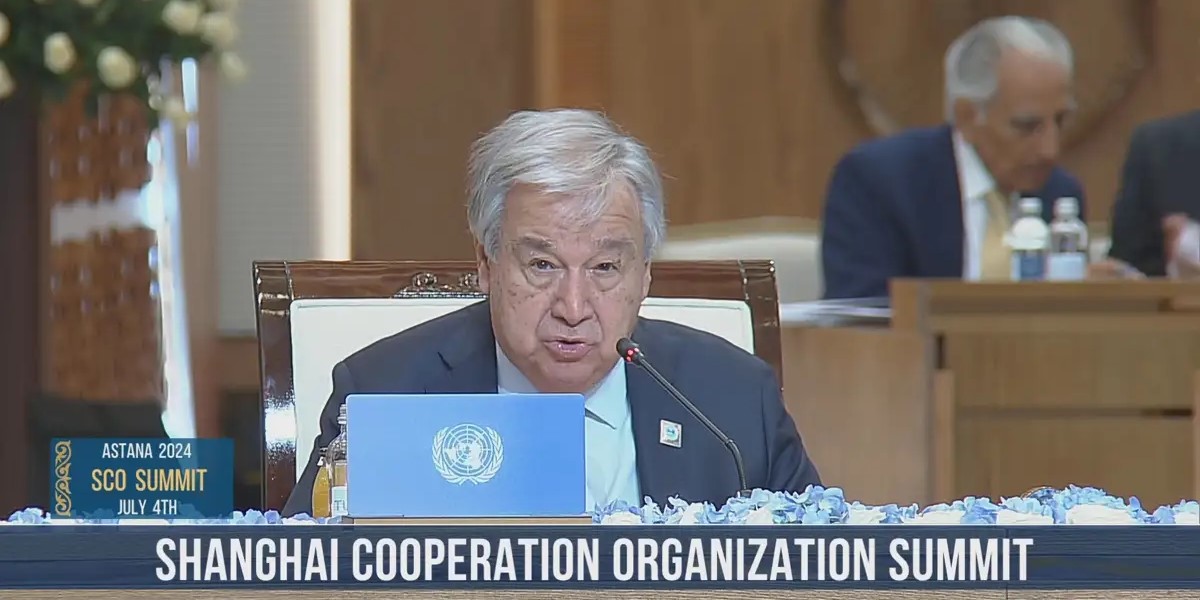
The UN Secretary General António Guterres at the 2024 SCO Summit. Source: Silkway TV
Environmental Security and Sustainable Development
Following discussions on various ecological and climate change issues, such as sandstorms and floods, and placing a high emphasis on sustainable development, the summit designated 2025 as the "Year of Sustainable Development for the SCO" (Xinhua). Welcoming the initiative, the United Nations Secretary-General António Guterres highlighted the need to end deep global divisions and conflicts to address the two major existential threats: climate change and the negative impact of the artificial intelligence (AI) boom (Kaz Inform). ‘Artificial intelligence holds enormous potential to accelerate sustainable development for the benefit of all. But it is racing ahead of regulation, exacerbating power imbalances, further concentrating wealth, undermining human rights, and increasing tensions and divisions. We urgently need the full engagement of governments, working with tech companies, academia and civil society, to agree on risk management frameworks for AI – and on monitoring and mitigating their harms,’ noted Guterres.
Member states noted the negative impacts of extreme weather events such as sandstorms and floods on economic, social, and environmental sustainability, emphasizing the need for joint action plans at regional and sub-regional levels (AKI Press). Facing issues such as glacier melt, water resource reduction, and the threat to food security, Kazakhstan’s President Tokayev proposed an action plan to address the degradation of water sources and to introduce new water-saving technologies. The joint efforts of the SCO member states in this direction will contribute concretely to achieving the International Year of Glacier Protection goals, designated by the United Nations General Assembly (Kaz Inform).
It was also reported that within the framework of the SCO announcing the year 2025 as the “Year of Sustainable Development”, Russia intends to create unified tools for carbon neutrality and corporate social responsibility. This was announced by Boris Titov, the Russian president’s special envoy for relations with international organizations, explaining that unifying standards and working toward a single system of GHG allowance allocation are the top directions in this regard (TASS).
Cultural Cooperation
Cultural topics such as tourism, sports, and education were also discussed at the summit. The Chinese city of Qingdao will succeed Almaty as the SCO's tourism and cultural capital for 2024-2025 (Astana Times). Russian President Vladimir Putin also offered to organize major sporting events within the SCO framework and invited sports teams from various countries to Yekaterinburg to take part in the International University Sports Festival in August (Kremlin). Further efforts for cultural exchanges are expected in the future.

